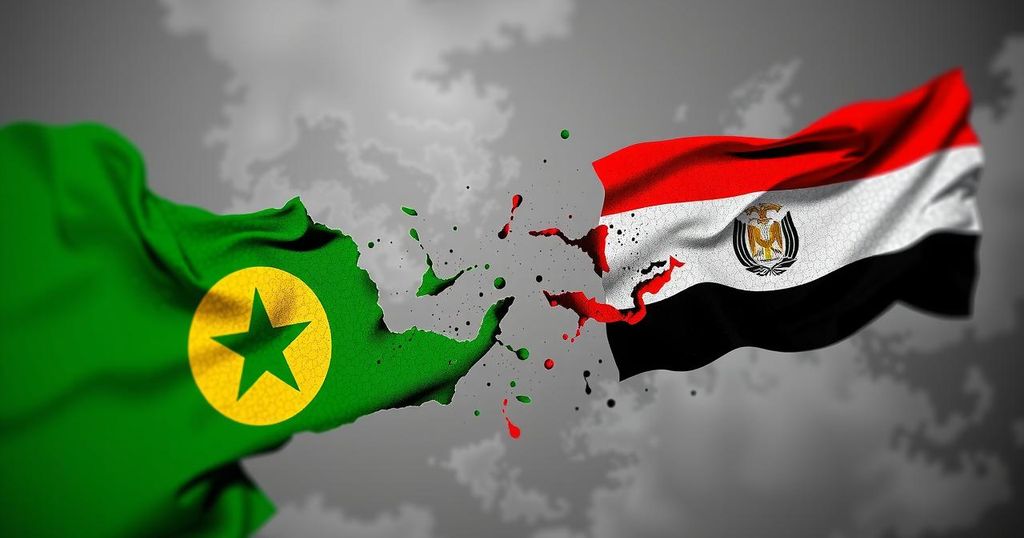Somalia, Egypt, and Ethiopia: The Emerging Threat to Regional Stability

The defense agreement between Somalia and Egypt has strained relations with Ethiopia, jeopardizing counterterrorism efforts against al-Shabaab. As coalition unity falters, the AU mission faces critical challenges, leading to potential instability. European diplomatic intervention is necessary to mediate tensions and reinforce security in Somalia amidst rising threats from al-Shabaab.
The recent defense agreement between Somalia and Egypt has generated tensions with Ethiopia, threatening to destabilize the ongoing efforts to combat the jihadist group al-Shabaab in Somalia. Following a mortar attack on a military base in Mogadishu, claimed by al-Shabaab, it is evident that the group continues its violent campaign despite military advancements against it. The current coalition against al-Shabaab, which includes federal and state governments and international partners, is witnessing fragmentation due to escalating divisions, particularly as Ethiopia’s position and support are called into question due to the Egypt-Somalia pact. The peacekeeping mission led by the African Union, specifically ATMIS, is essential for Somalia’s security given Ethiopia’s significant troop presence. Ethiopia currently plays a crucial role in both ATMIS and through bilateral agreements, yet tensions stemming from the defense pact with Egypt jeopardize this delicate balance. Egypt’s motivation for enhancing military ties with Somalia stems from its rivalry with Ethiopia over water security issues linked to the Grand Ethiopian Renaissance Dam. Furthermore, this agreement, which could potentially involve Egyptian troop deployments, may exacerbate internal divisions within Somalia, leading to a power vacuum that al-Shabaab could exploit. With major troop contributors at odds, the absence of a coherent strategy risks a reemergence of instability, allowing al-Shabaab to reclaim territories and influence. Additionally, this situation poses broader regional security risks, affecting neighboring countries such as Kenya and potentially inviting increased challenges for international actors vested in Somali stability. In light of this precarious situation, it is imperative for European diplomats to intervene to mitigate tensions, utilizing existing relationships with allied nations such as Italy and the United Kingdom to broker dialogue between Somalia, Egypt, and Ethiopia. Historical ties and economic interests can help these countries reduce hostilities and work towards a unified security approach in Somalia. Even if immediate resolution between Egypt and Ethiopia remains unlikely, the European Union, Italy, and the UK hold considerable leverage through their financial commitments to Somalia and the peacekeeping missions. Coordinated efforts, including the engagement of partners like Turkey and the United Arab Emirates, could create frameworks for increased cooperation and support for Somali security forces. Without decisive action to mend these state relations, the backdrop of civil strife could empower al-Shabaab and its affiliates, leading to serious implications not only for Somalia but for broader regional stability.
The conflict between Egypt, Somalia, and Ethiopia centers around Somalia’s recent defense pact with Egypt and its potential repercussions for security in the Horn of Africa. Al-Shabaab, an extremist group, has thrived amidst the power struggles between these states, exploiting the fragile political landscape and ongoing military operations. Ethiopia has long been a major contributor to the African Union’s military presence in Somalia, working to stabilize the region and fight al-Shabaab’s influence. Therefore, the recent deterioration in relations among these countries complicates existing military and peacekeeping strategies crucial for Somalia’s stability.
In summary, the defense pact between Egypt and Somalia poses significant threats to regional stability and the fight against al-Shabaab. The tensions arising from this agreement jeopardize the cooperation needed to strengthen Somalia’s military response and maintain peacekeeping efforts. Urgent diplomatic interventions from the European Union and its allies are essential to mediate these conflicts and promote a concerted approach toward ensuring security in Somalia and the surrounding region, particularly in light of al-Shabaab’s persistent threat to state and regional stability.
Original Source: ecfr.eu








